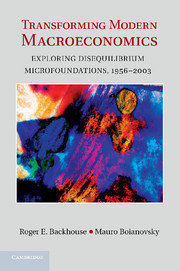Description
Transforming Modern Macroeconomics
Exploring Disequilibrium Microfoundations, 1956–2003
Historical Perspectives on Modern Economics Series
Authors: Backhouse Roger E., Boianovsky Mauro
This book tells the story of the search for disequilibrium micro-foundations for macroeconomic theory.
Language: English
Subject for Transforming Modern Macroeconomics:
Approximative price 36.76 €
In Print (Delivery period: 14 days).
Add to cart
Transforming Modern Macroeconomics
Publication date: 08-2014
Support: Print on demand
Publication date: 08-2014
Support: Print on demand
Approximative price 100.60 €
In Print (Delivery period: 14 days).
Add to cart
Transforming Modern Macroeconomics
Publication date: 11-2012
238 p. · 15.5x23.1 cm · Hardback
Publication date: 11-2012
238 p. · 15.5x23.1 cm · Hardback
Description
/li>Contents
/li>Biography
/li>
This book tells the story of the search for disequilibrium micro-foundations for macroeconomic theory, from the disequilibrium theories of Patinkin, Clower and Leijonhufvud to recent dynamic stochastic general equilibrium models with imperfect competition. Placing this search against the background of wider developments in macroeconomics, the authors contend that this was never a single research program, but involved economists with very different aims who developed the basic ideas about quantity constraints, spillover effects and coordination failures in different ways. The authors contrast this with the equilibrium, market-clearing approach of Phelps and Lucas, arguing that equilibrium theories simply assumed away the problems that had motivated the disequilibrium literature. Although market-clearing models came to dominate macroeconomics, disequilibrium theories never went away and continue to exert an important influence on the subject. Although this book focuses on one strand in modern macroeconomics, it is crucial to understanding the origins of modern macroeconomic theory.
1. Introduction; 2. Macroeconomics after Keynes; 3. Don Patinkin and the neoclassical synthesis; 4. Clower, Leijonhufvud and the re-appraisal of Keynesian economics; 5. Macroeconomics with slow price adjustment; 6. 'Equilibrium' microfoundations; 7. General equilibrium and imperfect competition; 8. Microeconomics and macroeconomics; 9. After the 1970s; 10. Conclusions; Bibliography.
Roger E. Backhouse is Professor of the History and Philosophy of Economics at the University of Birmingham, where he has taught since 1980, and at the Erasmus University Rotterdam. In 2007 he was Ludwig Lachmann Research Fellow in the Department of Philosophy at the London School of Economics. He currently holds a Leverhulme Trust Major Research Fellowship. He is the co-editor (with Philippe Fontaine) of The History of the Social Sciences since 1945 (Cambridge, 2010) and The Unsocial Social Science? Economics and Neighboring Disciplines since 1945 (2010) and (with Bradley W. Bateman) of The Cambridge Companion to Keynes (Cambridge, 2006). He is co-author (with Bradley W. Bateman) of Capitalist Revolutionary: John Maynard Keynes. He is author of The Puzzle of Modern Economics, The Ordinary Business of Life and The Penguin History of Economics. He has written for a number of journals including Economica, the Journal of Economic Perspectives, History of Political Economy, the Journal of the History of Economic Thought and the Journal of Economic Methodology. He has been review editor of the Economic Journal, editor of the Journal of Economic Methodology and associate editor of the Journal of the History of Economic Thought.
Mauro Boianovsky is Professor of Economics at Universidade de Brasilia, where he has taught since 1996, when he obtained his PhD from the University of Cambridge. He is the editor of Business Cycle Theories: Selected Texts, 1860–1939 (2008) and co-editor (with Kevin Hoover) of Robert Solow and the Development of Growth Economics (2009). He has written for a number of journals including History of Political Economy, the Cambridge Journal of Economics, the European Journal of the History of Economic Thought, Structural Change and Economic Dynamics and the Journal of the History of Economic Thought. Professor Boianovsky has been on the advisory board of History of Political Economy, the European Journal of the History of Economic Thought, Cahiers D
Mauro Boianovsky is Professor of Economics at Universidade de Brasilia, where he has taught since 1996, when he obtained his PhD from the University of Cambridge. He is the editor of Business Cycle Theories: Selected Texts, 1860–1939 (2008) and co-editor (with Kevin Hoover) of Robert Solow and the Development of Growth Economics (2009). He has written for a number of journals including History of Political Economy, the Cambridge Journal of Economics, the European Journal of the History of Economic Thought, Structural Change and Economic Dynamics and the Journal of the History of Economic Thought. Professor Boianovsky has been on the advisory board of History of Political Economy, the European Journal of the History of Economic Thought, Cahiers D
© 2024 LAVOISIER S.A.S.




